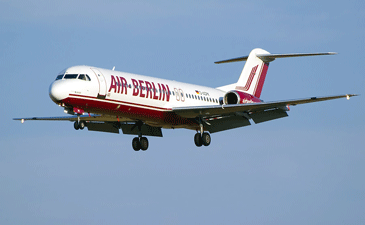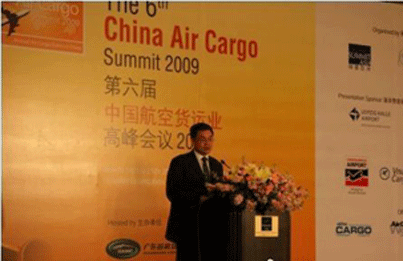

 |
 |
|
| |
||
|
Vol. 8 No. 37 WE COVER THE WORLD Wednesday April 1, 2009 |
Air Berlin TUIfly Partnership
  |
Germany’s number two and three ranked airlines
agreed on a mutual ownership by exchanging 19.9 percent of their shares. While
TUIfly acquired the Air Berlin stake for €68.4 million Euros, Air Berlin
paid €36 million Euros for the deal.
Both airlines announced a close strategic alliance
beginning this October.
At that point, Air Berlin will wetlease 17 Boeing
737-800 aircraft on long term conditions from Europe’s leading leisure
company and tour operator, Hannover-based TUI.
The passenger planes will be deployed on German
and European city routes like Cologne-Rome or Berlin-Nuremberg. Parallel TUIfly
will keep 24 of their aircraft within their own fleet for carrying tourists
to destinations around the Mediterranean Sea, the Canary Islands or destinations
at the Red Sea in Egypt.
Further to the financial and operational pact
both enterprises have just inked, Air Berlin announced the purchase of 15.3
percent of the airlines’ shares by Turkish ESAS Holding.
Formerly this package belonged to U.S. billionaire
Leonid Blavatnik who sold the shares last January.
ESAS stepping in could now pave the way for a
new German-Turkish airline pact since the investor possesses Istanbul-based
leisure carrier Pegasus Airlines together with IZair of Izmir.
"I could well imagine that there will be
opportunities for both the passenger and cargo business," stated Aydin
Alpa, VP Cargo at Pegasus when asked by Air Cargo News FlyingTypers.
Meanwhile Air Berlin increased its €40 million
euros mounting deficit of fiscal 2007 by posting newly made losses after taxes
of €75 million Euros in 2008.
The turnover climbed slightly to €3.4 billion
Euros.
The airline confirmed plans to sell the airfreight
subsidiary leisure Cargo.
This is supposed to happen at the end of April,
the airline announced.
Heiner Siegmund
 With
the theme of exploring China’s competitive air cargo market and the rising
of new freight carriers, the 6th China Air Cargo Summit 2009 was held on March
24 and 25 at South China’s Guangzhou New Baiyun Airport.
With
the theme of exploring China’s competitive air cargo market and the rising
of new freight carriers, the 6th China Air Cargo Summit 2009 was held on March
24 and 25 at South China’s Guangzhou New Baiyun Airport.
For the second time since the first session in
2004, this two-day conference is in Guangzhou, organized by Guangdong Airport
Management Corporation (GAMC) and China Southern Airlines.
Over 200 officials and executives attended the
event, discussing the way to face the current recession in the air cargo market
and improve the profitability.
Mr. Liu Zijing, (left) President of GAMC addressed
the opening of the summit:
“China’s RMB4 trillion fiscal spending
is underway. Plans for revitalization of ten key industries are being implemented
step by step, all these measures bring us confidence on the development of airport
economy and air cargo business in China.
 “Moreover,
a second round of economic growth in the Pear River Delta region is foreseen,
as part of the Development Plan (2008-2020) for the region released by the central
government in the end of 2008.
“Moreover,
a second round of economic growth in the Pear River Delta region is foreseen,
as part of the Development Plan (2008-2020) for the region released by the central
government in the end of 2008.
“New Baiyun Airport and cargo business here
would be the first to get through this economic winter.”
Mr. Zhang Kejian, General Executive of Baiyun
Airport introduced the four factors that will promote the building of Baiyun
Airport into a cargo hub: new logistic parks, new air cargo infrastructure (including
the third runway), new aircraft maintenance program and the running of Asia-Pac
FedEx Hub.
As to speakers from carriers, Luo Laijun, (right)
General Executive of Cargo Department of China Southern, spoke of taking the
company through the current difficulty:
“Support from the government and industry
association, plus improvement of corporate governance, that’s the way
of helping domestic cargo carriers get out of the plight more effectively.”
Also attending were executives from Jade Cargo
International, Shanghai Pudong Airport, Sichuan Airport, Boeing, Airport Macau,
etc.
From our files: Civil Aviation Minister Praful Patel flagging off the
GATI-Air India partnership and the first freighter in November 2007. On
his right (in a light suit) is Mahendra Agarwal, MD and CEO of GATI. The
others in the photo are Anita Khurana of Air India Cargo (behind Agarwal),
V Thulasidas, the then Chairman of Air India and K L |
Not too long ago, GATI was part of of India’s
top few logistics majors.
Now while the company is still a respected major
force here, as the global downturn also affects the Indian economy, GATI has
started shedding weight.
In what could be termed as a dramatic turn of
events, GATI recently said in a rather cut-and-dry memo that it had terminated
its wet lease of five Boeing 737-200 cargo freighters from Air India.
Consequently, those same freighters leased by
Air India have also been withdrawn with immediate effect.
“Our strategic alliance with Air India is
being continued as usual without affecting air cargo movement business,”
GATI said in a statement.
For background, GATI had signed a joint venture
pact with Air India Cargo to take on domestic aviation cargo major Blue Dart
Express, owned by DHL India, a unit of the German postal services giant Deutsche
Post.
The GATI-Air India first flight took off on November
14, 2007 on the Delhi-Mumbai-Bangalore-Delhi sector. The agreement with Air
India barely lasted for a year.
Industry experts told Air Cargo News FlyingTypers
that GATI had been finding it very tough to maintain loads.
GATI’s last financial results, released
in December 2008, showed that its air freighter business was bleeding the company.
In the half year that ended in December 2008 results
showed that the logistics major had lost Rs 16 crore on the air freighter business.
“It was all due to the load factor coupled
with the recessionary trend,” a source said.
“The company sought to take preventive action
by shifting surface cargo to air.
“That, however, did not contribute to the
organic growth of the air cargo business.
“At that time, the management had said that
it was taking “remedial action”—in other words, they were
getting out of the business.”
Industry pundits maintain that GATI’s decision to enter the air cargo
business was ill-timed.
“The first signs of the downturn were apparent
and GATI should have seen the writing on the wall then.
“It is strange that it did not.”
In fact, on October 22, 2008, GATI Chairman K
L Chugh, speaking at the 13th Annual General Meeting of the company had mentioned
to his shareholders that “whereas the (logistics) industry has over the
past few years predicted growth to over $125 billion from the current $90 billion,
the next 2-3 years could see sluggish growth.”
But he held out a ray of hope:
“On account of the current problems, even
more companies will outsource their logistics portfolio to specialist logistics
operators and concentrate on doing what they can do best.”
“GATI’s airfreight saga, had it worked
would have brought about a revolutionary change in the express cargo segment
by providing end-to-end connectivity,” an industry observer noted.
“In fact, Mahendra Agarwal, GATI’s
Managing Director, Chief Executive Officer and Director had mentioned to this
correspondent at that time that the business model had been created to cater
to the upcoming global cargo hub at Nagpur.
He had mentioned that the partnership with Air
India was expected to take
GATI’s business from the then $115 million
to more than $250 million within two years.
GATI had also planned to invest $100 million in
the next three years —that is till June 2009—to set up Express Distribution
Centres (EDC) and in re-engineering of technology and network.
But for now at least all of that is over.
Where then does that leave Air India Cargo?
The carrier moves around 2,000 tons of cargo daily
on international and domestic routes and that includes belly cargo as well as
dedicated freighters.
The termination of the agreement with GATI, according
to Air India, will not upset those plans of expansion in the cargo sector.
Air India has converted two of its Airbus 310s to freighters as well as three
of its seven B737s.
By 2015, Air India says that it expects to field
40 freighters.
Tirthankar Ghosh
|